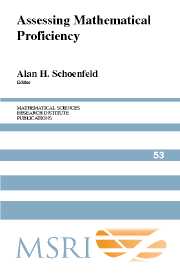Book contents
- Frontmatter
- Contents
- Preface
- Acknowledgments
- Section 1 The Big Picture
- Section 2 Perspectives on Mathematical Proficiency
- Section 3 What Does Assessment Assess? Issues and Examples
- Section 4 The Case of Algebra
- Section 5 What Do Assessments Assess? The Case of Fractions
- Section 6 The Importance of Societal Context
- 17 Assessment in France
- 18 Assessment to Improve Learning in Mathematics: The BEAR Assessment System
- 19 English Learners and Mathematics Learning: Language Issues to Consider
- 20 Beyond Words to Mathematical Content: Assessing English Learners in the Mathematics Classroom
- 21 Assessment in the Real World: The Case of New York City
- 22 Perspectives on State Assessments in California: What You Release Is What Teachers Get
- Epilogue: What Do We Need to Know? Items for a Research Agenda
- About the Authors
- Subject Index
- Author Index
- Task Index
18 - Assessment to Improve Learning in Mathematics: The BEAR Assessment System
Published online by Cambridge University Press: 06 July 2010
- Frontmatter
- Contents
- Preface
- Acknowledgments
- Section 1 The Big Picture
- Section 2 Perspectives on Mathematical Proficiency
- Section 3 What Does Assessment Assess? Issues and Examples
- Section 4 The Case of Algebra
- Section 5 What Do Assessments Assess? The Case of Fractions
- Section 6 The Importance of Societal Context
- 17 Assessment in France
- 18 Assessment to Improve Learning in Mathematics: The BEAR Assessment System
- 19 English Learners and Mathematics Learning: Language Issues to Consider
- 20 Beyond Words to Mathematical Content: Assessing English Learners in the Mathematics Classroom
- 21 Assessment in the Real World: The Case of New York City
- 22 Perspectives on State Assessments in California: What You Release Is What Teachers Get
- Epilogue: What Do We Need to Know? Items for a Research Agenda
- About the Authors
- Subject Index
- Author Index
- Task Index
Summary
Introduction
The Berkeley Evaluation and Assessment Research (BEAR) Center has for the last several years been involved in the development of an assessment system, which we call the BEAR Assessment System. The system consists of four principles, each associated with a practical “building block” [Wilson 2005] as well as an activity that helps integrate the four parts together (see the section starting on p. 325). Its original deployment was as a curriculum-embedded system in science [Wilson et al. 2000], but it has clear and logical extensions to other contexts such as in higher education [Wilson and Scalise 2006], in largescale assessment [Wilson 2005]; and in disciplinary areas, such as chemistry [Claesgens et al. 2002], and the focus of this chapter, mathematics.
In this paper, the four principles of the BEAR Assessment System are discussed, and their application to large-scale assessment is described using an example based on a German assessment of mathematical literacy used in conjunction with the Program for the International Student Assessment [PISA 2005a]; see also Chapter 7, this volume). The BEAR Assessment System is based on a conception of a tight inter-relationship between classroom-level and large-scale assessment [Wilson 2004a; Wilson and Draney 2004]. Hence, in the process of discussing this large-scale application, some arguments and examples will be directed towards classroom-level applications, or, more accurately, towards the common framework that binds the two together [Wilson 2004b].
- Type
- Chapter
- Information
- Assessing Mathematical Proficiency , pp. 311 - 332Publisher: Cambridge University PressPrint publication year: 2007
- 6
- Cited by



